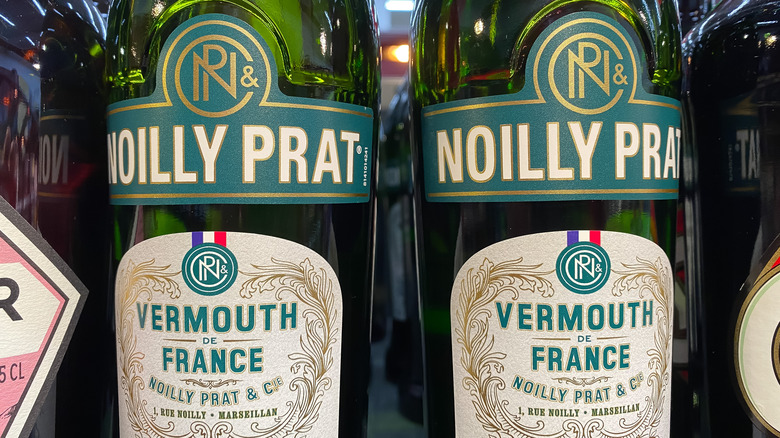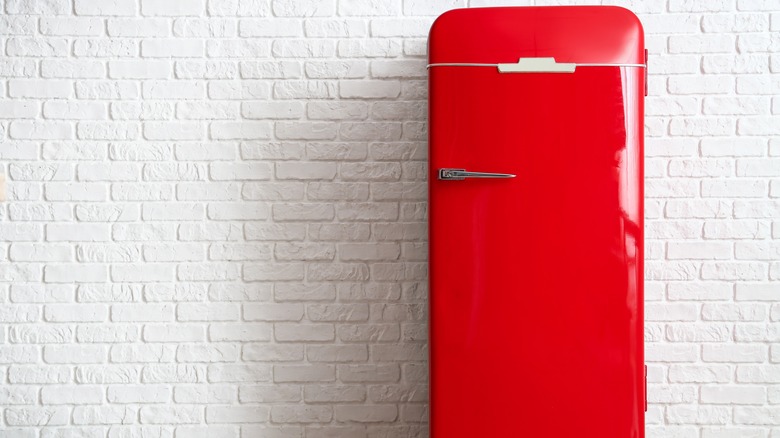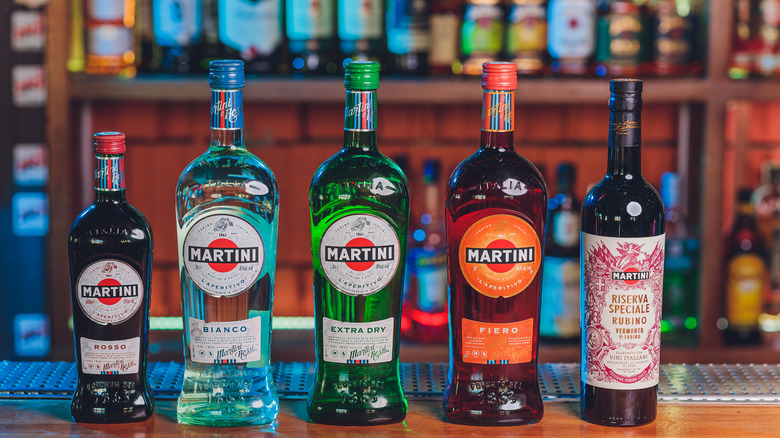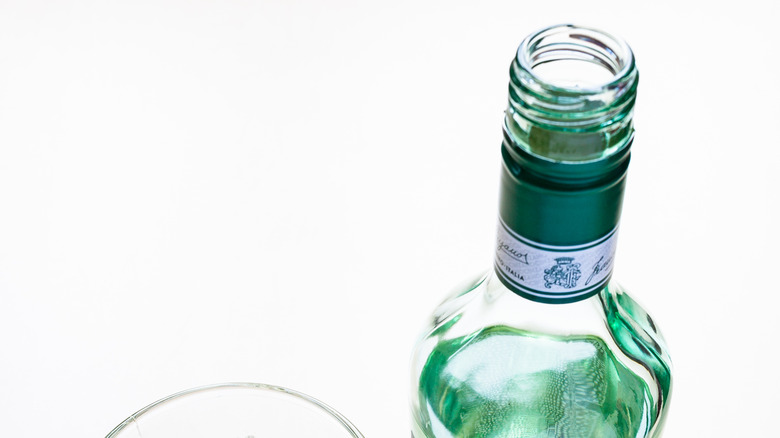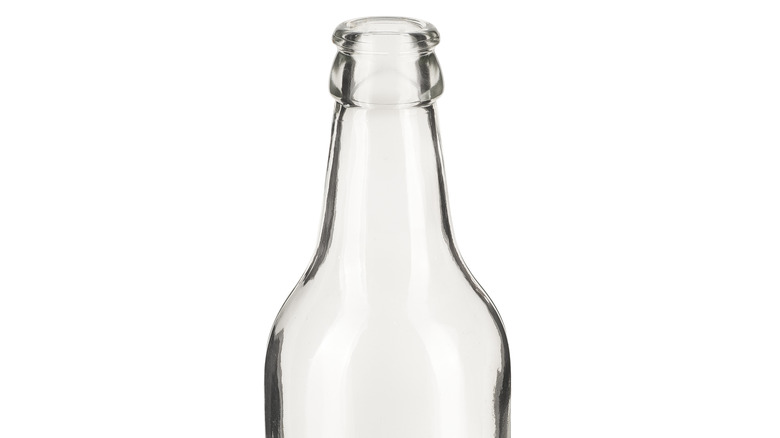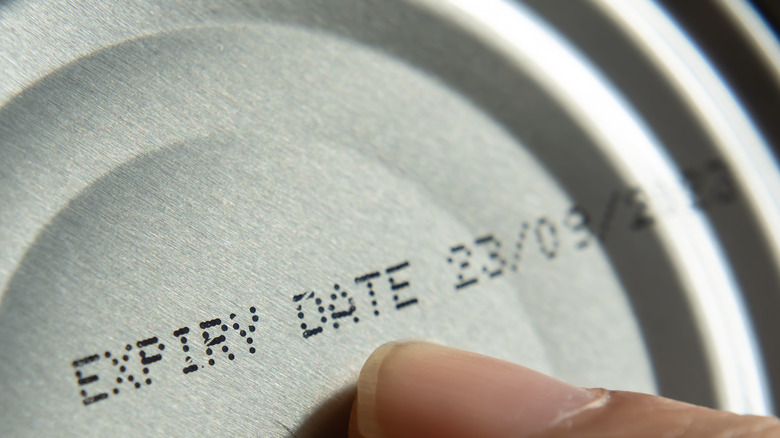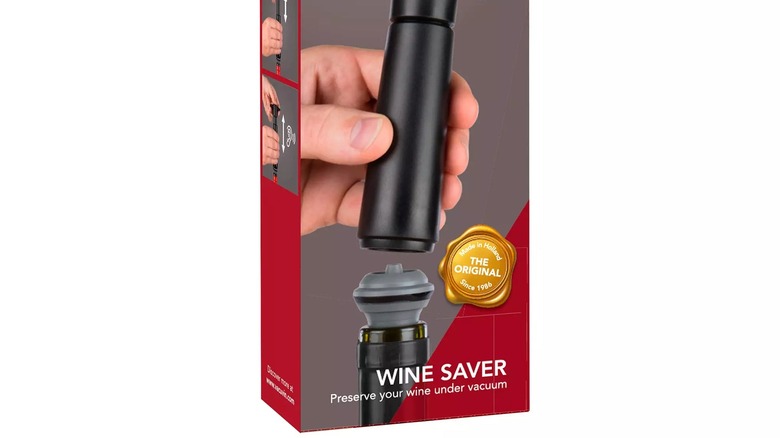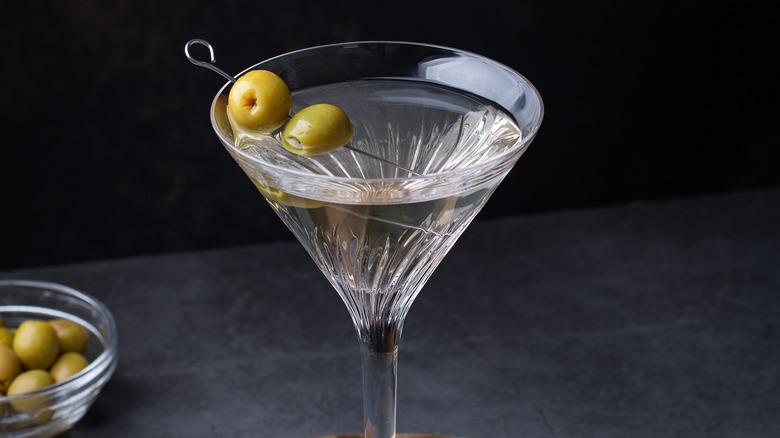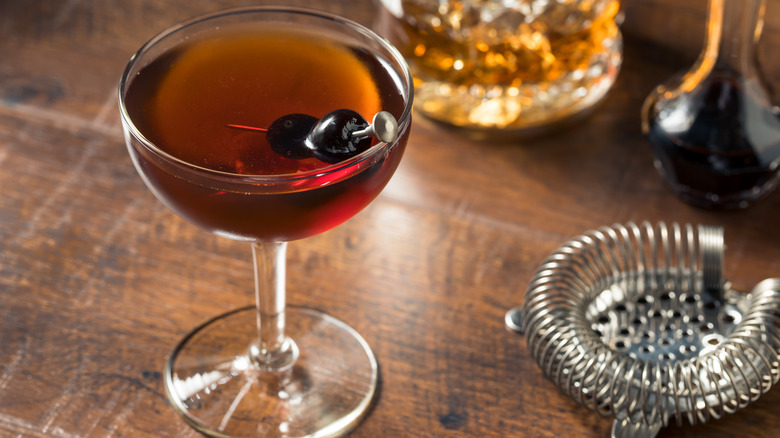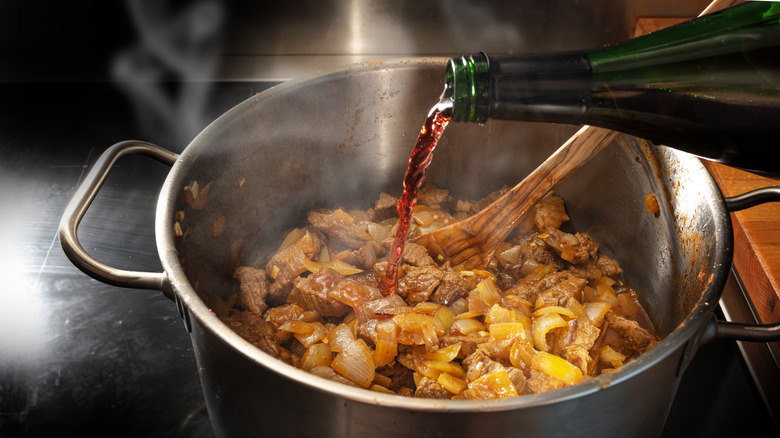11 Tips For Keeping Vermouth Fresh For As Long As Possible
If you like making cocktails at home, keeping a bottle or two of vermouth on hand is essential. From Manhattans to martinis to Negronis, it's a key component in a slew of classic cocktail recipes. It's also delicious on its own when served on the rocks with a twist, or mixed with soda water as a spritz. As crucial as it is to include vermouth in your arsenal of adult beverage-related ingredients, it's just as important to ensure you keep it fresh. And unlike the gin, vodka, rye, or bourbon with which you might combine this boozy powerhouse, keeping vermouth fresh for as long as possible requires a little know-how.
Vermouth is an aromatized wine that gets its unique flavor from botanicals, herbs, spices, and other ingredients. It's fortified with distilled alcohol, so it lasts longer than your standard bottle of wine, but it's still helpful to conceptualize vermouth as more akin to wine than liquor when it comes to proper storage. Keeping vermouth fresh is paramount to maintaining its flavor — and using vermouth that's gone off in a cocktail is a recipe for a sub-par drink. As finicky as it can be, there are a few tips to keep in mind for keeping both dry and sweet vermouth at its finest. From proper storage to finding tasty ways to incorporate more vermouth into your drinking habits, we're here to help make sure you never throw away a bottle again.
Keep it in the fridge
Just like a bottle of white wine needs to be refrigerated after it's opened, so does a bottle of vermouth. This rings true for all varieties, so don't let the fact that you can get away with keeping red wine at room temperature for a few days lead you to believe that the same goes for red vermouth. It doesn't!
Once it's opened, vermouth both sweet and dry needs to stay cold to prevent flavor-damaging oxidation from occurring. This means that as chic and aesthetically pleasing as a nice bottle of vermouth may look on your bar cart, it still needs to be relegated to the fridge. Though it's a shame that such an important ingredient has to be kept next to your container of oat milk instead of being proudly displayed on the bar, it's a sacrifice you have to make to keep it from going bad.
Even when you keep vermouth in the fridge, it still only stays fresh for about a month. That said, it's best not to open a new bottle the day before you start dry January, go on a month-long vacation, or just generally don't plan on doing much imbibing. In these situations, you're better off grabbing a cocktail at a bar.
Buy smaller bottles
Even if you drink a lot of cocktails at home, most recipes only call for a small measure of vermouth — so it's going to take you a while to get through a bottle. A standard martini only uses about half an ounce (and less if you like your martinis dry), and while Manhattans and Negronis use a full ounce of the stuff, a big bottle of vermouth can feel never-ending. Unless you're hosting a party and plan on serving vermouth-centric cocktails (which, by all means, please do), it's best to stick to small bottles.
Opting to buy vermouth in smaller quantities has two advantages when it comes to preserving freshness. The first is that you'll be able to finish the bottle faster, and the second is that smaller bottles mean less surface area. This means that less of the vermouth will be exposed to air, which causes unwanted oxidation.
An added perk of buying small is that when you finish up a bottle of vermouth, it gives you the opportunity to experiment with new brands and styles until you find one you love. Once you find your favorite, you'll be pleasantly surprised at how much of a difference it makes in your cocktails — even when you're just adding half an ounce to a martini.
Store it properly
This one is another example of how you can think about vermouth as you'd think about wine. Even when it's unopened, it needs to be stored away from light and heat in order to preserve its flavor integrity. You'd never leave an expensive bottle of wine sitting by your kitchen window (or at least, you shouldn't!), and the same goes for an unopened bottle of vermouth.
You don't need a wine cellar or even a wine fridge to keep your bottles from going bad, either. All you need to do is stick it in the pantry, in a cupboard, or in your liquor cabinet. If you buy a bottle of vermouth on a hot summer day, don't leave it in the car while you spend hours doing other errands. If your apartment doesn't have air conditioning (which is all the more reason why you'll need a couple of ice-cold martinis), just try to put your vermouth in the least sweltering location you can find.
When it comes to storing any type of booze, it's always a good idea to look into how to properly store it, so we recommend applying this tip to any beverage you purchase. You might be surprised at what you'll learn about storing booze once you start researching.
Minimize air exposure
You don't have to go crazy with this one, but just put the top back on your bottle as soon as you're finished pouring. Oxygen is the enemy here, so if you can reduce the amount of time your bottle sits open — even if it's for just a few minutes in between making cocktails — then you might as well. Re-capping the bottle immediately also reduces the likelihood that you'll forget, and leave your poor bottle sitting out while you sip on your beverage.
Make sure the top is all the way on and sealed when you put the bottle back in the fridge. If you lose the top (it happens, especially after a few drinks), use a wine stopper or another tight-fitting lid to replace it. Don't use tin foil or cling wrap unless you find yourself in a real pinch, in which case, get a better cap as soon as possible.
This tip might not seem important, but small steps can add up, and anything you can do to preserve the life of your vermouth is worth it, in our opinion.
Transfer it to smaller bottles
If you're serious about keeping your vermouth as fresh as possible, you can transfer it from its original bottle into smaller ones. This isn't the quickest or easiest solution, but remember: Air is the enemy of fresh vermouth. Smaller bottles contain less room, and therefore less surface area that leaves the vermouth exposed to harmful oxygen.
This is a great hack if someone gifted you a jumbo bottle of vermouth, or you found a big bottle at a small price, or you didn't look closely enough at the specs when you purchased a bottle of vermouth online. Rather than standing by and letting all that vermouth go to waste (or drowning yourself in Americano cocktails), just put it in small, clean, tightly sealed bottles. All you need is a funnel, a steady hand, and a few minutes of your time to extend the lifespan of this precious ingredient. However, it's important to keep in mind that even if you put your vermouth into teeny, tiny containers (which is probably unnecessary), it still won't last indefinitely.
You don't need to buy new bottles for this, either. Keeping this tip in the back of your mind will encourage you to reduce, reuse, and recycle. As an added bonus, transferring vermouth into small bottles makes it a lot easier to transport, so you can throw it in a cooler to make cocktails the next time you go on a weekend getaway.
Check the best by date
Unopened vermouth doesn't last forever, so you should check the "best by" date before you buy it. Even if you find one bottle that's a few months younger than another, it still means it's fresher — and it will buy you some time if you don't plan to open it for a while. Of course, liquor stores monitor their inventory closely and should never knowingly sell you an old bottle, but mistakes happen. It never hurts to take a glance at the date to ensure you're spending money on a fresh product.
Luckily, unopened vermouth has a lifespan of about three to four years if stored properly, so it's not as much of a race against the clock as it is for, say, a gallon of milk. However, it's also more important than it is for distilled spirits or wine, so do yourself and your cocktails a favor and check the date. This tip isn't just for the liquor store, either. We highly recommend checking the dates on any bottles you may have been storing in your cabinet. After all, time flies, and you might realize that it's been years since you bought that bottle of sweet vermouth.
Vacuum seal your bottle
For serious vermouth connoisseurs or people who only indulge in the very occasional at-home beverage, there are devices out there called Wine Savers. These tools essentially vacuum out the air from bottles, which as we've mentioned, is what causes vermouth to go bad. Not only are they handy for keeping bottles of wine nice and drinkable, but they also work just as well for bottles of both sweet and dry vermouth.
The best part is that Wine Savers aren't expensive, and they'll save you from throwing money down the sink in the form of spoiled vermouth. We like that they're small, sleek, dishwasher-safe, and can be used on any non-sparkling beverage. Once you vacuum out the air, you'll hear a click that signals your bottle is sealed and airtight. Sometimes harnessing the power of modern technology is the best way to handle something as simple as closing a bottle of booze.
Wine savers also make great gifts for anyone who enjoys a nice glass of wine (or vermouth), and it's the perfect item to bring alongside a bottle as a host/hostess gift. Having a few on hand for last-minute gifts can be a real lifesaver.
Don't shy away from wet martinis
One foolproof (and delicious) way to keep vermouth from going bad is to use it. Many people opt for dry martinis because they think it sounds cool, or they've heard someone else order them that way, or they don't really know what it means. While there's nothing wrong with a dry martini, wet martinis (which means heavy on the vermouth) are delicious.
Unfortunately, wet martinis have fallen out of fashion in today's contemporary cocktail culture, but we implore you to try one. Vermouth adds flavor, complexity, and nuance, and in our opinion, makes a martini taste better. A martini made with a healthy dose of vermouth will taste more like a balanced, quaffable cocktail than a straight cup of cold booze (we're not trying to call anyone out here, but that's the reality of what a martini made with no vermouth really is). Whether you prefer your martinis with olives or a twist, up or on the rocks, with vodka or with gin, there's no wrong way to drink a wet martini.
If you have both dry vermouth and sweet vermouth you need to use in a hurry, try making a perfect martini. This tasty cocktail contains a hefty pour of each. Don't be afraid to start some new trends and introduce your friends and family to the exciting cocktail realm that exists beyond dry martinis — they'll thank you.
Try a reverse Manhattan
As the name implies, a reverse Manhattan, like many reverse cocktails, swaps the ratios for rye (or bourbon) and sweet vermouth that's called for in the traditional Manhattan recipe. Since you'll be using two ounces of vermouth instead of one, you're essentially doubling how fast you'll go through the bottle if a Manhattan is your drink of choice. The resulting beverage is sweeter and a little lighter in alcohol, but equally delicious as the classic variation. Stirring up one of these is a great way to get out of a cocktail rut, while still enjoying everything you love about a Manhattan.
A nice tip for remembering the ratio for a classic Manhattan (at least for New Yorkers) is to think about Manhattan's area code — 212. The standard recipe is two ounces of rye or bourbon, one ounce of sweet vermouth, and two dashes of Angostura bitters. Once you memorize that, remembering the ratio for a reverse Manhattan will be a breeze, and you'll have a whole new cocktail you can whip up at a moment's notice without having to consult the internet.
Another tip for making an impressive reverse Manhattan is to use nice cherries. This is not the time or place to rely on the neon red variety you'd find in a Shirley Temple. Grab a jar of high-quality Luxardo cherries and garnish to your heart's content.
Switch up your spritz
Aperol isn't your only option when it comes to concocting a delicious spritz. Vermouth and soda water come together to make a tasty, refreshing summertime (or, let's be honest, anytime) sipper. Most people tend to think of vermouth as merely a modifier, and don't appreciate the fact that vermouth can actually be the star of the show. However, as soon as you try vermouth as the base of a spritz, you'll never overlook this libation's potential again.
A vermouth spritz can be made with whatever kind of vermouth you please and garnished with either a citrus peel or an olive. Take a page from Spanish drinking culture and serve your spritz with a simple, salty snack like potato chips for the ultimate in late afternoon leisure. It's an easy-drinking, low-ABV treat that will make finishing up a bottle of vermouth a breeze. Once you try one, you might have a hard time keeping vermouth around for very long.
Drinking vermouth spritzes is a great way to ease into drinking vermouth on the rocks, which is also a delicious habit.
Cook with it
If you like the idea of keeping vermouth fresh by using it, this one's for you. By now, it's probably no surprise that we're going to ask you to think about vermouth as you think about wine and consider it a valuable addition to a variety of dishes. Dry vermouth can be subbed for white wine in things like pasta, poultry, and seafood. The flavor will be a little stronger, but it will get the job done beautifully (and you can always add a little less if you're concerned about the flavor overwhelming your dish).
Sweet vermouth can work as a great substitute in recipes that call for port. Dishes like stews or braised meats are enhanced by the sweet, botanical complexity of vermouth. You can also try it instead of wine for deglazing pans or thinning out sauces. This is a great solution if you have a bottle of vermouth that's on its last leg. It feels a lot better to make use of a bottle in a home-cooked meal than it does to throw it away or make a mediocre drink. Don't forget to pour yourself a splash to sip on while you're cooking. After all, as the chef, you deserve it.
